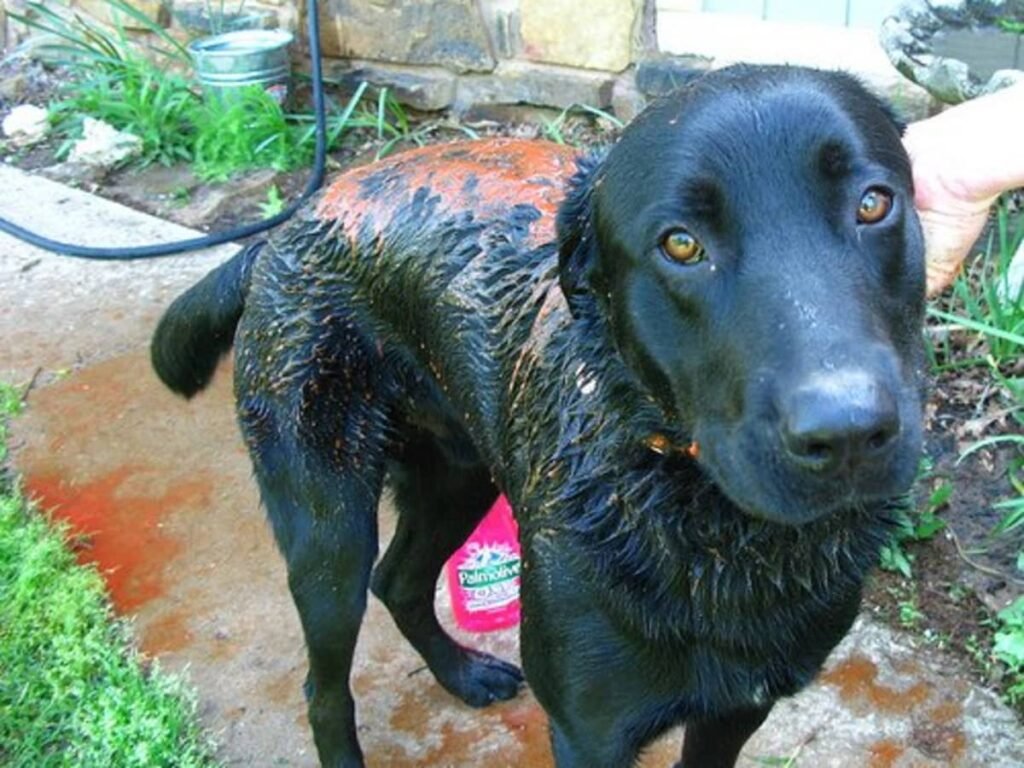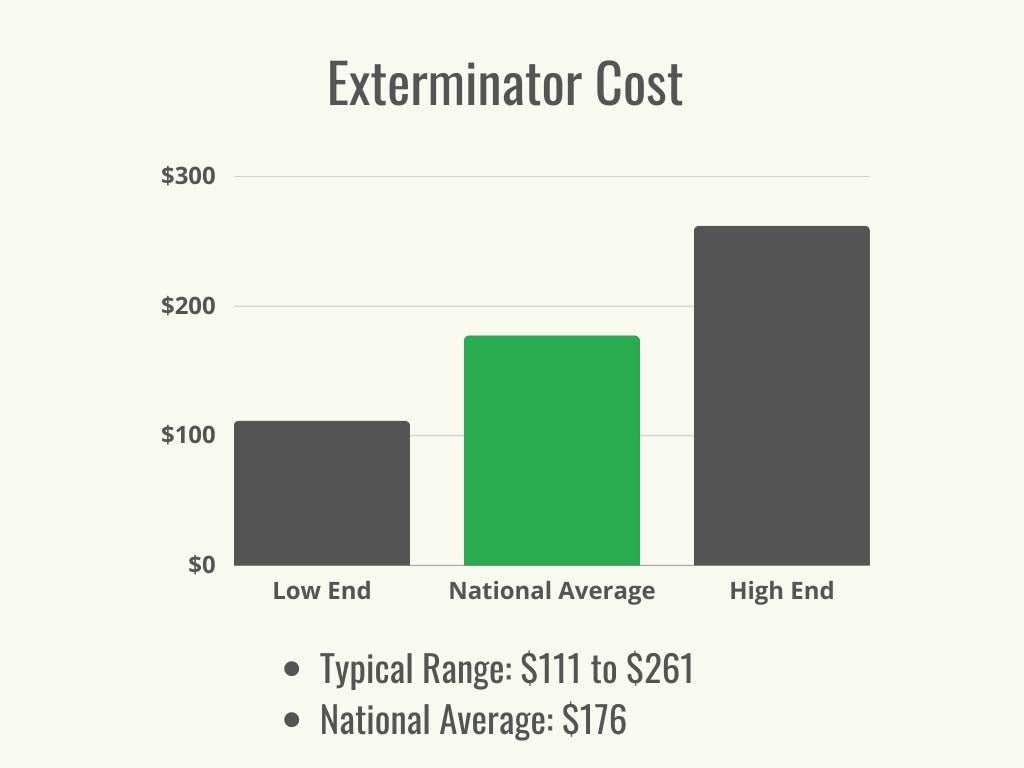You’ve probably heard the old wives’ tale about using tomato juice to get rid of skunk smell, but is there any truth to it? In this article, we’ll separate fact from fiction and explore whether tomato juice is really an effective remedy for the pungent odor of a skunk spray. So, the next time you find yourself in a stinky situation, you’ll know whether reaching for the tomato juice is the right move or just a bunch of hogwash.
Introduction
Are you struggling to remove that lingering skunk smell from your clothes, pets, or surrounding areas? You may have heard that tomato juice is the go-to remedy for this unpleasant odor, but is it really effective? In this article, we will explore the myth of tomato juice as a skunk odor remover, discuss other common remedies, delve into the chemistry behind skunk odor, evaluate the effectiveness of tomato juice, and offer alternative solutions. By the end, you’ll have a comprehensive understanding of how to tackle skunk smell and prevent future encounters.
The Myth of Tomato Juice
History of using tomato juice for skunk smell
For decades, tomato juice has been touted as a remedy for skunk odor. The belief is that the acidic nature of tomato juice can neutralize the compounds in skunk spray, eliminating the smell. This idea likely originated from anecdotal evidence of individuals claiming success with tomato juice. However, it is important to separate fact from fiction when it comes to skunk odor removal.
Scientific explanation for why tomato juice does not work
Despite the long-standing tradition, scientific evidence suggests that tomato juice is not an effective solution for removing skunk smell. The main reason behind this lies in the chemistry of skunk odor and the inadequacy of tomato juice to properly neutralize it. Skunk spray is composed of volatile sulfur compounds that are highly resistant to traditional treatments like tomato juice.
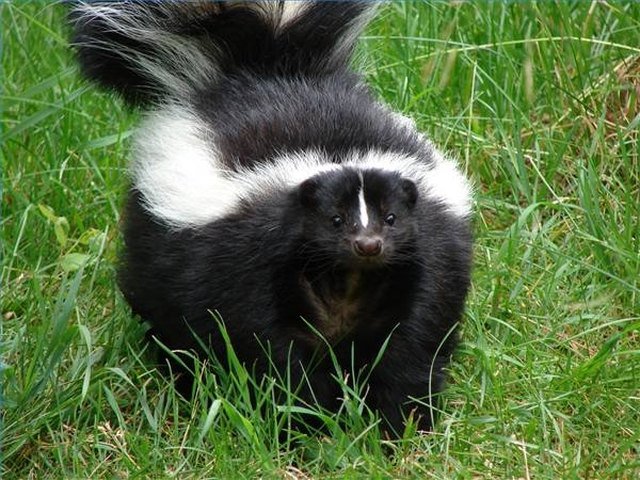

Other Common Remedies
Baking soda and hydrogen peroxide
A popular alternative to tomato juice is a mixture of baking soda and hydrogen peroxide. The baking soda acts as a deodorizer, while the hydrogen peroxide effectively breaks down the sulfur compounds in skunk spray. By combining these two ingredients into a paste and applying it to the affected area, you can effectively eliminate the skunk odor.
Vinegar
Vinegar is another commonly recommended remedy for skunk smell. Its acidic properties can help neutralize the odor-causing compounds. Simply dilute vinegar with water and use it to wash the affected area or soak items that have been in contact with skunk spray. However, keep in mind that vinegar may not completely eliminate the smell and may leave behind its own distinctive odor.
Citrus-based cleaners
Citrus-based cleaners, such as those containing orange or lemon extracts, can also be effective in eliminating skunk odor. Like vinegar, these cleaners have acidic properties that can break down the sulfur compounds and neutralize the smell. Apply the cleaner directly to the affected area or use it in the washing machine for fabrics.
Pet shampoos and sprays
If your furry friend has been sprayed by a skunk, using a pet shampoo or spray specifically designed to remove skunk odor can be a quick and convenient solution. These products are formulated to effectively neutralize the odor without causing any harm to your pet’s skin or fur. Follow the manufacturer’s instructions for best results.
The Chemistry Behind Skunk Odor
Composition of skunk spray
Skunk spray is a complex mixture of several compounds, the most notable being thiols. Thiols are sulfur-containing organic molecules that are responsible for the potent odor produced by skunks. These compounds are highly volatile and can bind to surfaces, making them difficult to remove.
Why skunk smell is difficult to remove
The difficulty in removing skunk odor lies in the chemical structure of the thiols. Thiols are low-molecular-weight compounds, meaning they are small and can easily permeate materials like fabrics. Additionally, their sulfur atoms form strong bonds with materials, making them resistant to simple cleaning methods. This is why traditional remedies like tomato juice and other household products often fall short in completely eliminating the smell.
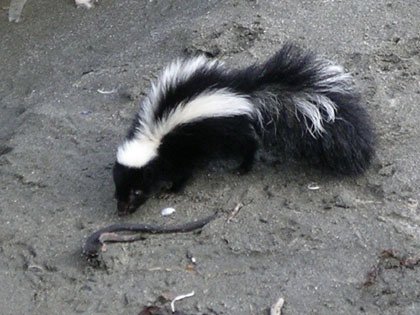

Effectiveness of Tomato Juice
Anecdotal evidence of tomato juice usage
While tomato juice is a widely circulated remedy for skunk odor, the effectiveness of it is mostly based on anecdotal evidence. Many people claim success with tomato juice, attributing the reduction in skunk smell to its acidity. However, it is important to note that anecdotal evidence does not always hold up scientifically.
Why tomato juice may provide temporary relief
Tomato juice may provide temporary relief from skunk smell due to its acidic properties. The acid can help to partially neutralize the odor-causing compounds, making the smell less intense. However, this relief is often short-lived as the volatile compounds in skunk spray can continue to emit odor even after the initial treatment.
Why tomato juice does not fully remove skunk odor
The main reason tomato juice is not considered an effective solution for skunk odor is its inability to break down the volatile sulfur compounds completely. While it may provide temporary relief, the skunk smell can quickly return, requiring additional treatments. It is crucial to consider alternative solutions that target the specific chemical composition of skunk spray for long-lasting odor removal.
Alternative Solutions
Activated charcoal
Activated charcoal is an excellent option for absorbing odors, including skunk smell. Its porous structure allows it to trap volatile compounds effectively. Place bowls of activated charcoal in the affected area or use activated charcoal filters in air purifiers to help eliminate the odor. Be sure to replace the charcoal regularly to maintain its effectiveness.
Hydrogen peroxide and dish soap
As mentioned earlier, a mixture of hydrogen peroxide and dish soap can be highly effective in removing skunk odor. The hydrogen peroxide breaks down the sulfur compounds, while the dish soap helps to dissolve oils and facilitate the removal process. Follow a recipe of combining these two ingredients, apply the mixture to the affected area, and let it sit for a few minutes before rinsing thoroughly.
Enzyme-based skunk odor removers
Enzyme-based skunk odor removers are specifically designed to target the sulfur compounds in skunk spray. These products contain enzymes that break down the odor-causing molecules, effectively eliminating the smell. Follow the manufacturer’s instructions for application and ensure thorough coverage of the affected area for optimal results.
Professional cleaning services
For severe cases of skunk odor contamination, it may be necessary to seek professional cleaning services. These trained experts have specialized equipment and knowledge to effectively remove skunk smell from various surfaces and areas. Additionally, they can provide recommendations on preventing future skunk encounters.
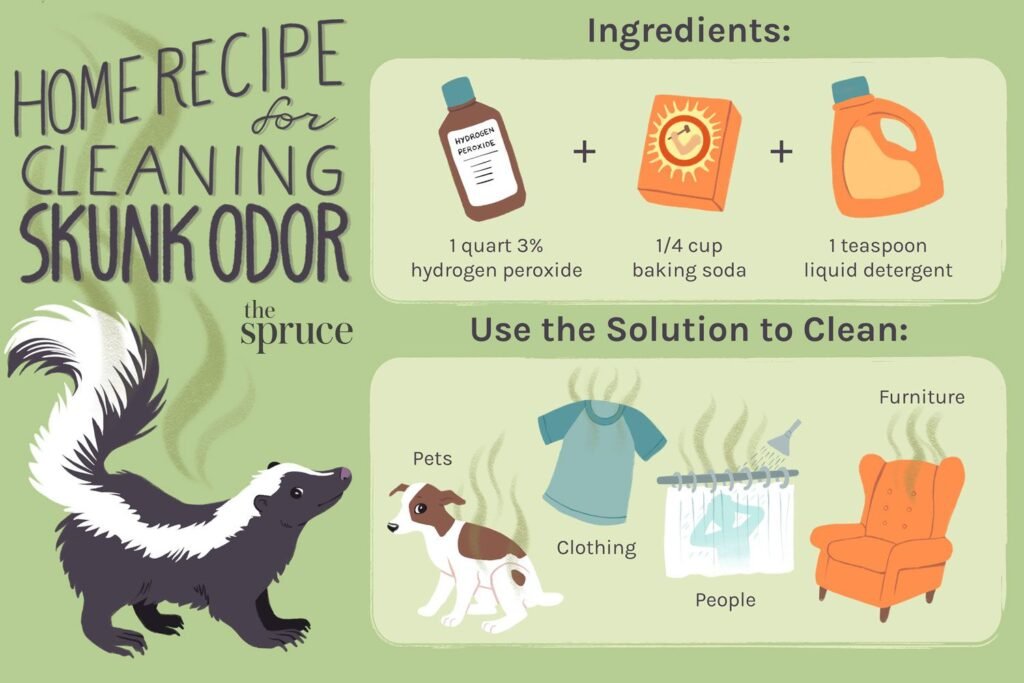

Preventing Future Skunk Encounters
Skunk-proofing your property
To minimize the chances of a skunk encounter on your property, there are several precautions you can take. Seal off any access points, such as gaps under decks or sheds, to prevent skunks from taking up residence. Use sturdy and secure garbage cans to deter skunks from rummaging through your trash. Consider installing motion-activated lights or sprinklers to startle skunks and discourage them from approaching your home.
Tips to avoid startling skunks
Skunks are typically non-confrontational unless they feel threatened. To avoid startling them, make noise when approaching areas where skunks may be present, such as dense vegetation or dark corners of your yard. This will give them the opportunity to retreat peacefully without feeling the need to spray. Keep pets indoors during skunk activity hours, typically at dawn and dusk, to minimize the risk of encounters.
Proper waste management
Skunks are attracted to easily accessible food sources, including pet food left outside or improperly stored garbage. By practicing proper waste management, such as securing garbage cans and storing pet food indoors, you can significantly reduce the likelihood of attracting skunks to your property. Minimizing the availability of food will discourage skunks from sticking around.
Conclusion
While tomato juice may have gained popularity as a skunk odor remedy, scientific evidence indicates that it is not the most effective solution. Skunk smell is caused by volatile sulfur compounds that require targeted treatments for complete elimination. Alternative solutions, like baking soda and hydrogen peroxide, vinegar, citrus-based cleaners, and enzyme-based odor removers, offer more reliable and long-lasting results. Additionally, preventing future skunk encounters through skunk-proofing your property and practicing proper waste management can help ensure a skunk-free environment. With these insights and strategies, you can confidently tackle skunk odor and enjoy a fresher, odor-free space.
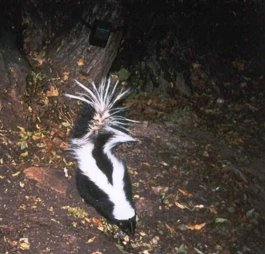

Additional Resources
References
- Will Tomato Juice Remove Skunk Smell? Separating Fact From Fiction
- Chemistry of Skunk Spray
- How to Get Rid of Skunk Smell
Further reading
Your Expert in Animal Control and Extermination. Trust our experience for humane, effective pest management, protecting your property and ensuring peace of mind with Michael S.


